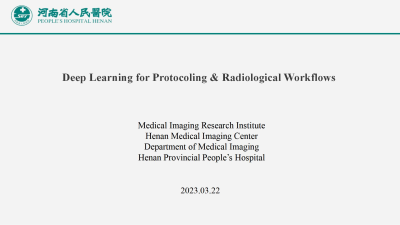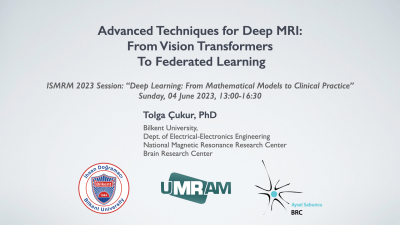Weekend Course
Deep Learning: From Mathematical Models to Clinical Practice
ISMRM & ISMRT Annual Meeting & Exhibition • 03-08 June 2023 • Toronto, ON, Canada

| 13:15 |
Fundamentals of Deep Learning
Efrat Shimron
Keywords: Image acquisition: Machine learning This educational talk will present core concepts in deep learning, including convolutional neural networks (CNNs), batch-normalization, and loss functions. Next, it will review architectures such as encoder-decoder, GANs, and physics-guided unrolled neural networks. Finally, it will present guidelines for careful design of training databases and discuss caveats of current deep learning techniques. |
|
| 13:45 |
 |
Deep Learning for Protocoling & Radiological Workflows
Meiyun Wang
Keywords: Education Committee: Clinical MRI With the rapid development of deep learning, its research in the field of MRI continues to deepen, and it has been applied in all aspects of image protocoling and radiological workflows. This lecture summarizes the promoting role of deep learning from three aspects: Image acquisition and reconstruction, Image post-processing and Intelligent clinical services. Finally, it analyzes the challenges of deep learning and provides an outlook on the future development, aiming at providing a reference basis for MRI techniques research and clinical transformation. |
| 14:15 |
 |
Supervised Learning for Image Reconstruction and Segmentation
Shekhar Chandra
Keywords: Image acquisition: Image processing, Image acquisition: Reconstruction, Musculoskeletal: Knee Achieving the successful deployment of image analysis models into clinical practice is challenging because they need to be not only robust (particularly to edge cases), but also meet the time efficiency and software development requirements for productization. This is before any consideration can be made to requirements for regulatory approvals. We will cover our experience in successfully deploying such imaging solutions that incorporate machine learning models and look to the future of deep learning models into clinical practice. |
| 14:45 |
Break & Meet the Teachers |
|
| 15:15 |
 |
Untrained Learning for Image Acquisition & Reconstruction
Kalina Slavkova
Keywords: Image acquisition: Reconstruction, Image acquisition: Machine learning, Image acquisition: Fast imaging Model-based reconstruction via deep learning techniques has shown great promise for reconstructing MR images from highly accelerated acquisition schemes, resulting in substantial scan time reductions. Aside from supervised and self-supervised trained methods that are optimized over large datasets and fast at inference, untrained methods are gaining prominence as a method for image reconstruction in the absence of training datasets. This talk will introduce untrained methods and will focus on their utility for reconstructing multi-contrast MR images in the context of quantitative imaging. |
| 15:45 |
 |
Advanced Techniques for Deep MRI: From Vision Transformers to
Federated Learning
Tolga Cukur
Keywords: Image acquisition: Machine learning, Image acquisition: Reconstruction, Image acquisition: Image processing MRI offers an unrivaled opportunity to examine the structure and function of biological tissues. Yet, MRI exams are hindered by limitations on quality and diversity of acquired images due to scan time considerations. Classical approaches to processing of imaging data often fail to address these limitations. In this talk, advanced machine learning techniques that help surpass these fundamental barriers will be discussed. Recent technical developments will be showcased ranging from architectural leaps with the introduction of vision transformers to collaborative leaps with adoption of federated learning frameworks. State-of-the-art results from these techniques indicate a bright future for deep MRI. |
| 16:15 | Application in the Clinic: Predicting Phenotypes, Prognosis & Outcome Greg Zaharchuk |
The International Society for Magnetic Resonance in Medicine is accredited by the Accreditation Council for Continuing Medical Education to provide continuing medical education for physicians.